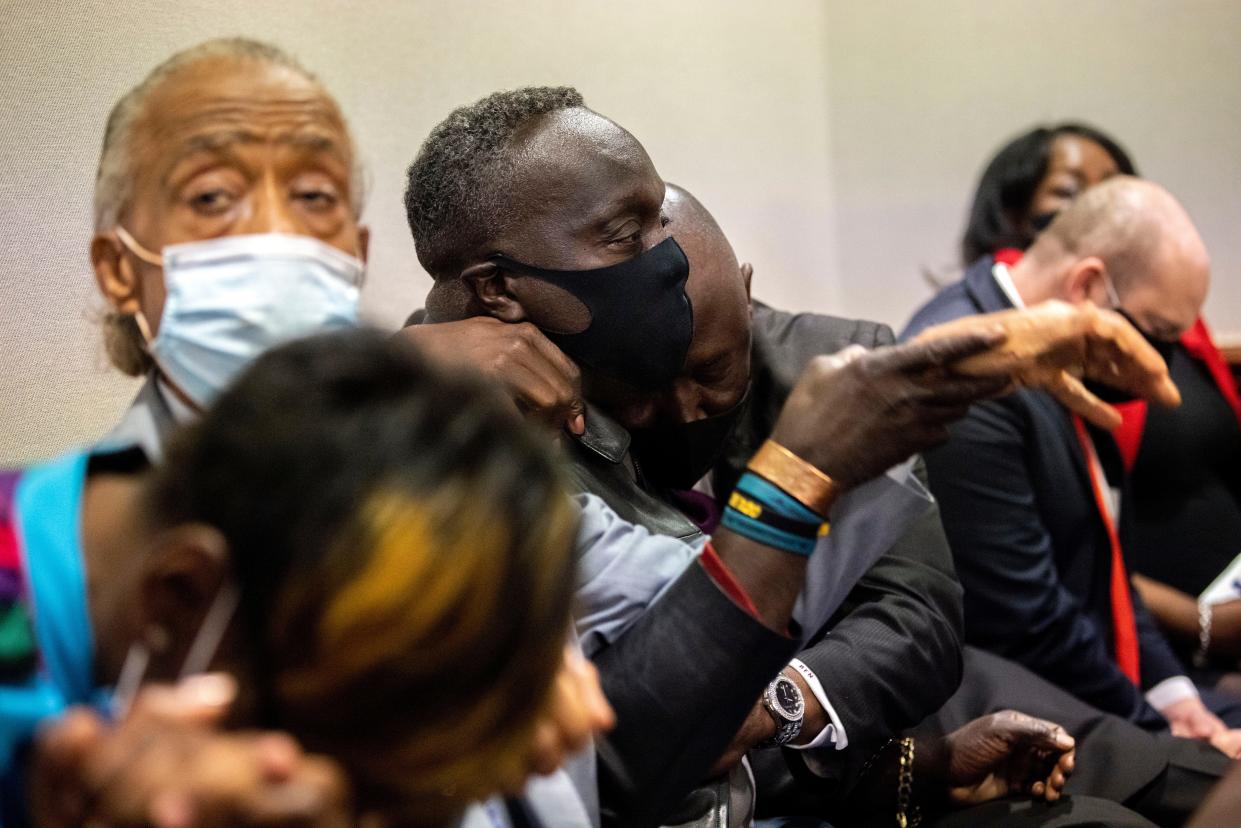It’s hard to salute a justice system that still perpetuates injustice

- Oops!Something went wrong.Please try again later.
After recent verdicts in the trial of three white men accused of killing an unarmed Black jogger, I admit to being ambivalent. No, it isn’t that I disagree with their murder convictions. Hardly.
Rather, verdicts in the shotgun slaying of Ahmaud Arbery capped a week of findings in cases of racial injustice that at once redeemed the criminal justice system and raised fears of futility.
First came the acquittal of Kyle Rittenhouse in the killing of two people and wounding of a third during a Black Lives Matter protest that followed the murder of George Floyd more than a year ago. Frankly, I didn’t buy the now-18-year-old’s self-defense argument. It never would have been taken seriously if a Black youth armed with an AR-15 rifle had been driven from out-of-state by his mother to supposedly protect the local citizenry, as Rittenhouse claimed.
So, yes, for me the jury’s ruling represented yet another nail in the coffin of criminal justice. No doubt millions joined me in flashing back to 2012 when George Zimmerman was acquitted in the killing of 17-year-old Trayvon Martin. Zimmerman, too, claimed self- defense.
This backdrop and the nation’s long, sordid history of racial injustice in the criminal justice system, which includes no accountability for the lynching of more than 40 Black people in Alachua County, makes it difficult to give jurors in the Arbery case a standing ovation, though they may deserve one.
After all, the jury convicted three white men who were engaged in similar circumstances as Zimmerman: The defendants were armed, pursued unarmed Black males and fatally shot them to death on the assumption that they’d committed a crime.
Nevertheless, as welcome as this departure from racial injustice in the courtroom may be, much work remains to reform a system out of whack. I hate to think of what might have happened if a videotape of the shooting hadn’t emerged 74 days after Arbery’s murder.
More from James F. Lawrence:
Canvassing showed support for family learning center
Gainesville For All initiative helps engage fathers in their children's lives
Spirituals sang at GNV4ALL event bring to mind past, continuing struggles
The need for reform isn’t diminished by other recent court rulings such as one involving nine people injured by white nationalists at a 2017 Virginia protest rally. They were awarded $25 million in damages by a federal jury that sent a powerful message against racial intolerance and religious bigotry.
I feel obligated to highlight these cases of seeming progress in the criminal justice system because they’re deserving of acknowledgement. Thus, my ambivalence.
Take two other cases involving racial and courtroom injustice that were recently resolved. Ninety-two miles away, a circuit court judge in Lake County, Florida, exonerated four Black males who were wrongly accused of raping a 17-year-old white girl in 1949. And in Missouri, a 62-year-old Black man was released from prison after serving more than 40 years of a life sentence for a triple murder he didn’t commit.
Kevin Strickland was freed without the use of DNA evidence. Because the state only compensates in wrongful prosecution cases involving the use of DNA evidence, he is ineligible for state compensation. Never mind that in Missouri, only 549 of 2,900 exonerations involved DNA.
Then there is the Groveland Four, who were aged between 16 and 26 at the time of their arrests. None of the four are still alive and their exoneration came more than 70 years after this travesty of justice during Florida’s Jim Crow era.
Sadly, in both exonerations, it must not be forgotten that justice came decades later. Remember the maxim, “Justice delayed is justice denied." See why it’s hard to salute a justice system that still perpetuates injustice?
James F. Lawrence is executive director of Gainesville for All. Send inquiries to gnv4all@gmail.com.

Correction: Kyle Rittenhouse’s mother did not drive him from Illinois to Kenosha, Wisconsin, and there is no evidence that he was armed when he left their Illinois home, according to court documents and testimony.
Join the conversation
Send a letter to the editor (up to 200 words) to letters@gainesville.com. Letters must include the writer's full name and city of residence. Additional guidelines for submitting letters and longer guest columns can be found at bit.ly/sunopinionguidelines.
Journalism matters. Your support matters.
Get a digital subscription to the Gainesville Sun. Includes must-see content on Gainesville.com and Gatorsports.com, breaking news and updates on all your devices, and access to the Gainesville.com ePaper. Visit www.gainesville.com/subscribenow to sign up.
This article originally appeared on The Gainesville Sun: James F. Lawrence: Recent court rulings don't diminish need for reform

